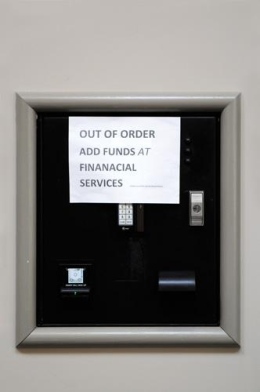 (Image: Lindsey Wasson/The Spectator)
(Image: Lindsey Wasson/The Spectator)
Note: Details on the State of Washington vs. Tina Mcvey case and its chronology were taken from SPD Detective Melvin Britt’s 2011 Case Investigation Report, as well as various other court records. Because the case is still in litigation, University Counsel declined to comment on the case and advised University faculty and staff to refrain as well. Public Safety Director Mike Sletten provided a timeframe of the investigation.
At the end of the 2010 school year, David Ingham made a discovery.
Ingham, the account systems manager at the Seattle University Controller’s office, noticed that deposits had not been made from campus “revaluation machines” for a long time.
“Revaluation Machine” is the proper name for the black consoles on campus embedded in the wall near ATMs in the University Service Building and the Student center. If your meal plan is running low, or you want extra cash for laundry or vending machines, students and faculty can “reload” their campus card accounts with cash using the machines.
Oversight of the machines, as well as most campus technology systems, is the responsibility of Sungard, an external IT Service provider that began working with SU in 2003. After noticing deposits hadn’t been made from the revaluation machines in an unusually long time, Ingham reviewed accounts received from Sungard and noticed some alarming discrepancies.
Over the course of the 2008-2009 fiscal year, $53,598 had gone missing.
In the 2009-2010 fiscal year, $84,895 had disappeared.
In total, $138,493 deposited by students and faculty in campus revaluation machines simply was not there.
It had vanished.
Ingham picked up the phone and called Tina McVey.
Not long after, McVey quit.
—
Sungard and Seattle U’s Office of Information Technology began releasing a seasonal newsletter in 2008 called “SU Tech Talk.” In the Spring 2009 edition, a small feature was included called “Five Minutes With Tina McVey.” In it, McVey is interviewed briefly about her employment at Seattle U through Sungard. Starting in 2007, she began serving as the Campus Card Administrator, the duties of which she sums up in the interview as “oversee[ing] the Campus Card office, the people who staff it, and the card services that the University authorizes.”
McVey mentions working closely with payroll, Student Financial Services, Housing and Resident Life and Bon Appetit. At the end of the interview, when asked what she likes most about her job, McVey replies, “I really enjoy interacting with everyone on campus and getting to know them better. Since everyone has to have a campus card, I think it’s great that I’ll eventually get to meet everyone!”
One of McVey’s primary responsibilities was the collection of funds for deposit from the revaluation machines on campus. McVey was to collect the money in a US Bank bag, along with the deposit receipt, and take them to Rommel Delacruz, the Senior Account Technician at the Controllers office. In a statement to the Seattle Police Department, Delacruz said McVey was “the only Sungard employee he took deposits from that he could recall.”
After the missing $138,493 was discovered, McVey turned in one last deposit, short of funds, and abruptly quit.
A staff investigation led by campus Pubic Safety director Mike Sletten was launched to look into the theft, which soon involved the Seattle Police Department.
“Concerns about money handling reached a point where we needed to contact plice about a criminal investigation,” Mike Sletten said. “We needed to get this reported through police right away.”
McVey’s sudden resignation after the discovery of the missing funds made her a person of interest in the investigation. Quickly, other suspicious details started cropping up:
- While in 2008-2009 McVey recorded 13 deposit slips, in 2009-2010, she only recorded five. The space between deposits in 2009-2010 spanned months at a time.
- McVey was discovered to have written checks to a collection agency in 2008.
- A court issued search warrant of her personal bank account revealed “McVey had large amounts of cash each month, above and beyond her regular pay being deposited into her bank account in even dollar amounts (i.e. $1000, etc.).”
The investigation lasted from Jul 2010 through the middle of 2011. Sletten facilitated the investigation with SPD, assisting with setting up appropriate interviews and coordinating logistics. Public Safety and the Controller’s office took control of the responsibility for account deposits from Sungard after the incident.
“We wanted to assure it was appropriately accounted for, dollar for dollar,” Sletten said.
During the period of the investigation when Public Safety and the Controller’s office took control of accounts, only a $1 to $2 discrepancy was noted.
After a review of the facts, probable cause was determined to charge Tina McVey with Theft in the 1st Degree. McVey was arrested on September 20, 2011.
—
How the University failed to notice large amounts of money being stolen for two years has yet to be addressed by Seattle University—however the University did assure The Spectator that no faculty, staff or student lost money in their account due to the theft.
Thanks to Chuck Porter, neither faculty, staff, nor student will really have to worry about it anymore.
The same Fall that McVey was arrested, Chuck Porter was hired to fill a newly created position at Seattle University—Chief Information Officer (CIO). The CIO job, while tech oriented, is not staffed through Sungard like McVey was. The CIO works strategically with Sungard from the university to prioritize technical investments on campus, and administer Sungard’s contract with the school. Porter is in many ways the mind behind the campus tech—he thinks about what the school has in the way of technology, and tries to make sure it gets what it needs.
One of Porter’s first priorities as CIO was to replace the campus card system.
“The system was built 12 years ago, and in tech you have to think about things in dog years, so that’s really old,” Porter said. “Door locks would stop working with cards when it rained, which we all know never happens in Seattle.”
Another concern of Porter’s about the system was that students couldn’t count on it to accurately reflect the balances in their accounts.
 Upgraded SU Cards might be part of the solution
Upgraded SU Cards might be part of the solution
“The revaluation machines were broken most of the time,” Porter said. “Faculty and students couldn’t even use them, let alone rely on them to tell them how much money they had.”
Over the summer, Porter replaced the entire system—installing new door swipers that activate with a simple tap of the campus card. He got rid of the revaluation machines altogether.
Instead, students have an entirely new way to manage their campus card debit accounts. A new website in its final stages of debug, https://campuscard.seattleu.edu, will debut around the time this newspaper comes out that will enable a slew of new capabilities to students. Students will now be able to add money to their accounts and check balances over the internet. Students can also give their parents access to add money to their campus card debit accounts remotely. If students lose their campus cards and are worried about someone taking them, they can also deactivate their current student cards over the internet.
“The risk that was present before has completely gone away,” Porter said. “This new system is much safer, and I think will be much easier for students.”
As for McVey—her first case scheduling hearing was originally scheduled in June of this year. The hearing has been delayed three times as McVey confers and reviews the case with her lawyers, but is currently set for September 24th.
The Seattle University Spectator is a student-run publication covering the school. CHS features Spectator reporting as part of a community collaboration. A portion of advertising revenue generated by the collaboration is donated to area non-profits involved with media, journalism and social causes. You can enjoy the Spectator online at su-spectator.com.



Besides her complete and utter lack of integrity & honesty, that is.
She probably was paid a really decent salary! At least, a solid living wage for sure, even if it wasn’t white collar.
I live on a 10/hr, non-profit job, and sometimes pick up extra work on the side, meanwhile people like this *somehow* think it’s ok to steal.